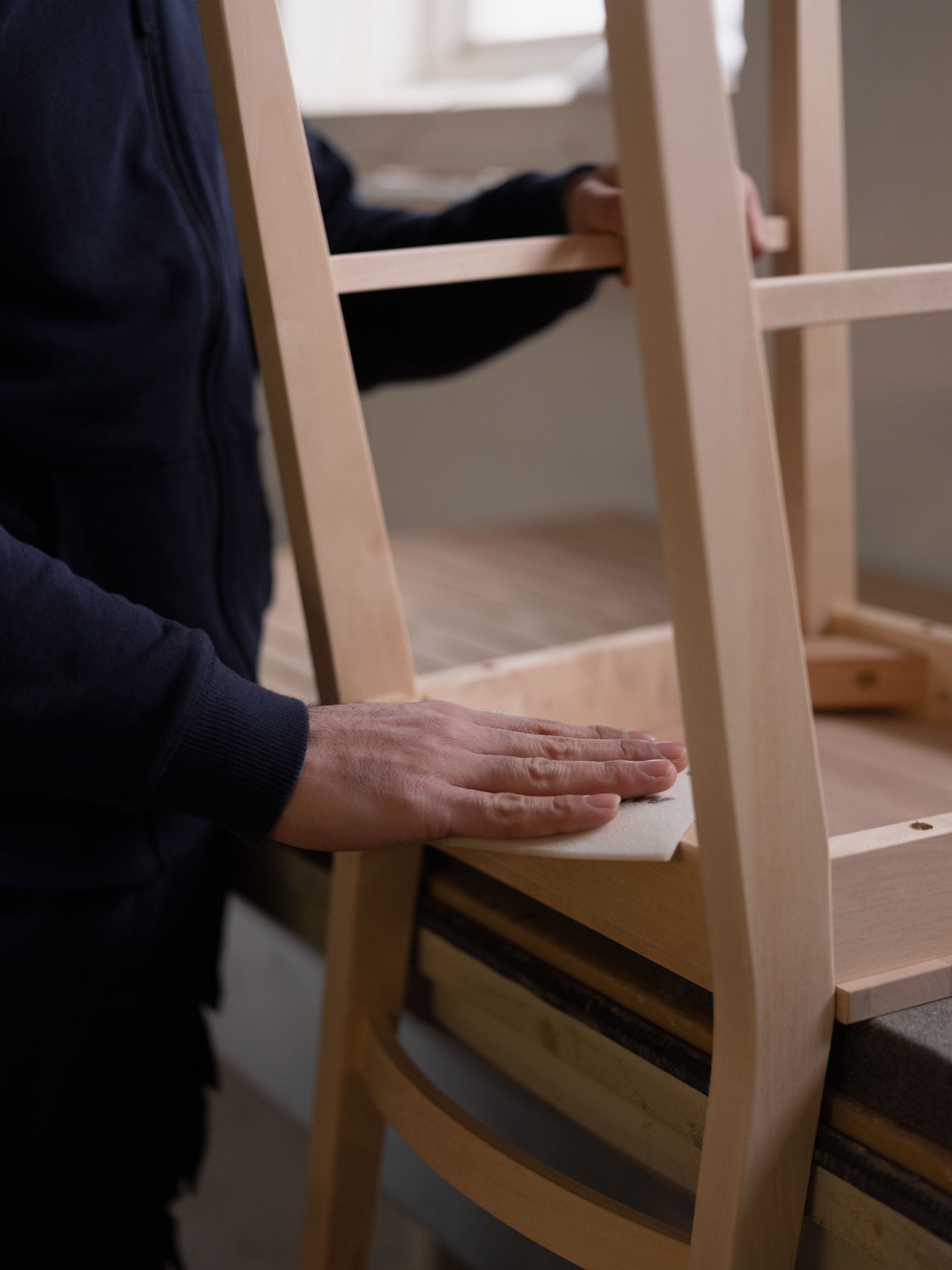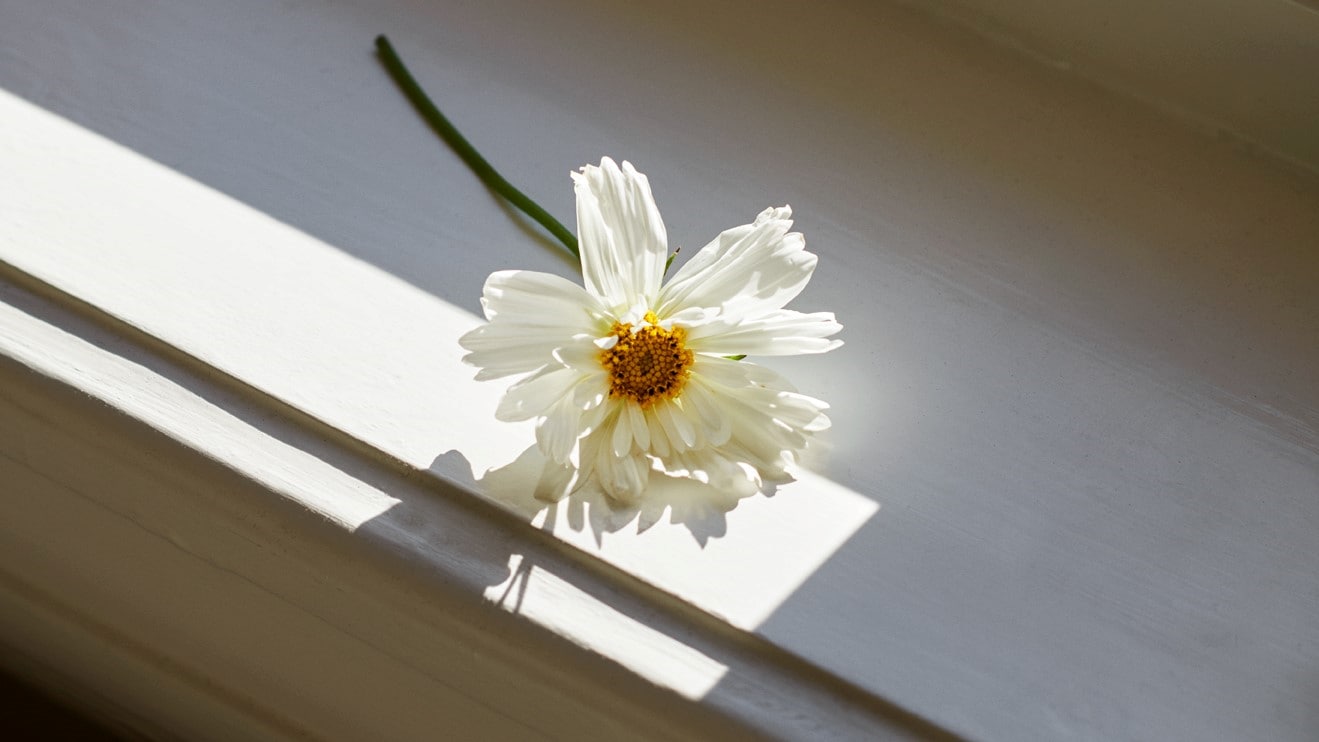Norrgavel furniture can be characterised using words such as simplicity, emotion and presence, as well as honesty and sustainability. But what we sell is not primarily furniture, it’s an approach to interior design, in fact to life as a whole. We have tried to capture this holistic view of interior design by describing our values as humanistic, ecological and existential.
Our core values
Humanistic, ecological & existential
1. HUMANISTIC – ABOUT PEOPLE
When we make our furniture and furnishings, we pay the greatest possible attention to details, function and the beauty of the design. Our aim at all times is to make the furniture the best it can possibly be. We don’t mean just at the point of purchase; our happiest moments come when customers come in to tell us about a quality they’ve noticed only after they’ve been using their furniture for some time.
EVERYDAY STYLES AND DESIGNS
We create practical furniture for everyday use, and we want our products to make everyday life simple and beautiful. Our aim is for our furniture to be both physically and financially accessible for as many people as possible, not least in the case of our BAS range. A piece of furniture from Norrgavel may seem like a major item of expenditure, but the cost in the long run can be small. Our sources of inspiration are from way back in the past: Karin and Carl Larsson’s home in Sundborn, Ellen Key’s ‘Skönhet för alla’ (Beauty for Everyone’), 1920s Classicism with ‘Vackrare Vardagsvara’ (‘More beautiful things in the home’ - Gregor Paulsson) and the HSB cooperative housing movement, Functionalism and the concept of the welfare state in housing areas such as Årsta, Stockholm.
FUNCTIONAL AND PRACTICAL
Our motto is ‘simplicity’. Not the sort of meagre simplicity that arises out of necessity, nor an artificial, minimalist simplicity, but a striving for an uncomplicated simplicity. Roughly translated: a table should look like a table. Uncomplicated and exquisite.
We want our furniture to be functional and practical. When we develop new products, we set great store by the experience and expertise accrued in Sweden in the last century such as from surveys of living habits and functional studies. So with, say, the inside measurements of a drawer, we ensure that it really can accommodate an A4 format for office use or can be used to maximum effect when storing clothes, such as folded tops. We might pay attention to the height and sitting angle of a chair, or check that there is room for the vacuum cleaner nozzle underneath low-level shelving and that upholstered furniture really can be fully cleaned.
RESPONSIVE AND FLEXIBLE
Rather than simply giving customers the opportunity to buy something ready-made, we want to encourage them to get involved in the creative process. Not only do we offer a wide range of choice in terms of size, woods and finishes, but many of our pieces of furniture (console tables, shelving, cupboards, BAS tables etc) are designed to be such that they can fit with the customer’s existing spaces and rooms. However, the customer’s own creativity need not only come into play at the point of purchase. The furniture is constructed so that it can easily be reupholstered, painted or repaired. Its simple design means that it has widespread uses – this, along with straightforward construction, allows for a more dynamic, nomad-like approach to the home.
2. ECOLOGICAL – ABOUT NATURE
Our ecocycle policy is at the core of our way of making furniture. Of course we sometimes find ourselves in a position where it would be tempting to block out environmental considerations, but that would merely feel like a romantic response, like turning a blind eye to reality. Taking this rigid stance means that we almost never get into debates about maximum concentrations and ecological limit values – instead we can get on and work with natural materials simply for the pleasure of it. Norrgavel was the first Swedish company to be granted the Nordic Swan Ecolabel for its home furniture, and in 1999 it won the Möbelbranschens Miljöpris (the Swedish furniture industry’s environmental prize) awarded in conjunction with the World Wide Fund for Nature (WWF).
MATERIALS AND PRODUCTION
Norrgavel works only with natural materials, for two reasons. In terms of the ecocycle, we are less likely to go seriously wrong if we keep strictly to renewable raw materials. The second reason is to do with how customers experience our products. The egg-oil tempera that amplifies the play of light and gives off an aroma when you open a cupboard. The purely physical sensation. Running your hand over a soft soap-finished piece of oak. The sensuality in a wooden handle or the different textures of linen. Natural materials often provide strong sensory stimulation, and they are also easy to look after and generally age gracefully.
Our furniture is mainly made of wood, which we source domestically as far as we can – we use birch, oak, beech and pine and, to a lesser extent, alder. We keep to solid wood as our furniture is intended for everyday use and needs to be able to withstand wear and tear. Aspiring to authenticity and honesty, we also want our materials to look like what they actually are. For many models, we leave the surface of the wood untreated; in other cases, we always use non grain-filling finishes such as oil, soft soap or egg-oil tempera that does not block up the pores. This helps to retain the wood’s hygroscopic properties, i.e. its ability to absorb and give off moisture. For upholstery padding, we use everything from horsehair and dwarf palm fibre to natural rubber and waterfowl feathers. Textiles are mostly linen and wool, sometimes with additions such as silk or viscose (cellulose fibres).
We try to ensure we use the smallest number of materials as possible, and if we use several in the same piece of furniture we make sure that they are kept well apart. This makes things easier in terms of both day-to-day care and also repair and future disposal. We often make our construction methods explicit, both to add to the attractiveness of the item and to help customers gain a clear understanding of their piece of furniture. To ensure our furniture has lasting strength, we generally use tried and tested forms of construction and assembly, sometimes inspired by folk traditions. We aim to make best use of the latest techniques. At the same time, because we offer the customer extensive options and because of the handcrafted feel of the furniture, many steps in the making process will always need to be carried out individually by hand.
FORM AND FUNCTION
You should be happy with the items we sell for a long time. It’s not always enough for them simply to last physically. They need both to stand the test of time in terms of durability and give enduring pleasure to the eye. In our aim to remain impervious to trends, we try to ensure our designs don’t make a song and dance about themselves.] This is an approach taken by role models in Nordic design from the 1930s, ‘40s and ‘50s: Bruno Mathsson, Alvar Aalto, Børge Mogensen and others.
Another important aspect from the ecological point of view is that of function. Both technology and social patterns change much more quickly in our day than they did in previous generations. That makes more demands on our furniture. If it is to be used over a long period of time, its design must be generic so that it can fulfil a variety of functions over its lifetime.
3. EXISTENTIAL – ABOUT ETERNITY
The humanistic stance emerged alongside democracy and issues around distribution of resources a hundred years ago. Then, over 50 years later, ecology made its appearance on the agenda. Nowadays, global conflict is often about existential values, resulting in struggles between different faith systems. Industrial, technological and scientific cultures have never taken on board these issues, but they are at the very core of the Norrgavel philosophy. What is the meaning of everything? How does Norrgavel relate to the art of being human?
WHAT IS ACTUALLY IMPORTANT?
It is perhaps exaggerating only slightly to say that the Western materialistic outlook on life nourishes our belief that our personality is the sum of, say, our social status, professional role and possessions. Perhaps “I am what I do/own”. An existential approach turns the concept on its head: “I do/own what I am”. So, in order to know what I need to do or what my material needs are, I need to find out who I am. Who am I?
What’s actually important in life? Vitally important? A glass of water when you’re really thirsty. The first crocuses of the spring. The birth of a child or the death of a close relative. Relinquishing control and letting yourself go. Being in good health. And besides, isn’t it often the case that it is those people who have had a serious illness or encountered some other life crisis who really know how to live?
Everything that is important in life is in some way paradoxical – whatever you say, the opposite is just as true. That’s true of our furniture too. In one way, their design is vitally important, but from another point of view the design is of course completely immaterial. This is not playing with words, or putting on airs. It’s an odd fact of life.
Buying furniture to make yourself happy is perhaps not a great idea. But if you’re happy in the sense of having an understanding of how to really live, it perhaps feels natural to indulge in something that gives you a really good feeling.
QUALITY IS THE SAME AS PRESENCE
Designers often like to claim that quality, in the sense of, say, excellent design, is in the nature of the item itself. By asking the question “Excellent for whom?”, we instead employ the concept of quality as the expression of a relationship, something that happens in the contact between the item and the person assessing it. Or designing it. Or using it.
At Norrgavel, we want to create relationships with our customers. Rather than encourage passive consumption, we try to make it easy for customers to be present in the purchasing moment and to have a relationship with the things they choose to surround themselves with – encouraging them, quite simply, to consume less but to give themselves permission to have things of greater quality.
Our intention is that a piece of Norrgavel furniture should act as your faithful servant. It should work well and make life simpler. An unobtrusive design that you only notice when using the furniture, but that is then all the more apparent. A chair that really supports the body, a handle designed to help fingers and hands to pull out a drawer. We create our furniture with the intention of it forming a backdrop to life rather than dominating. So we don’t feel that the design has to be amusing or create a sensation.
We draw our inspiration from Japanese traditions and the American Shaker style. The Shaker furniture makers said that they made their furniture for God. So second-best was not good enough! Even if, when describing our concept, we use the words Presence and Eternity rather than God, what we are talking about is exactly the same thing. Our motto is to do only what feels absolutely right, which usually matches what we are hoping to achieve. Supreme exquisiteness is what we strive for, and we try to give the whole 100% of ourselves to the process. We do that with real pleasure, as an act of love.
We find that this approach often strikes a chord with our customers. For many people, experiencing beauty leads to insights into what is really important in their own lives.
What is really important in life? The birth of a child and the death of a close relative. Moments of total presence. That is the presence I long for. In all its simplicity. To constantly be able to follow along in life's commute between unrestrained indulgence and quiet peace. As support during this journey, I want to surround myself with few things. Carefully selected, easy to live with and in their exquisiteness as fine as it ever gets.
Nirvan Richter




